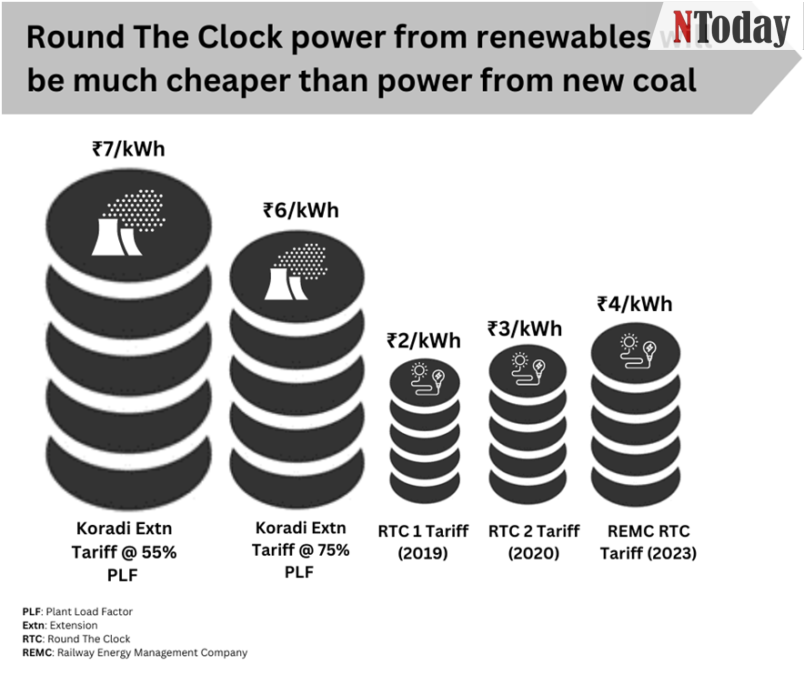
Nagpur: As Maharashtra plans a ₹10,625 Crore investment towards the addition of two 660 MW new coal units to the existing Koradi Power Plant- expected to start operating by 2029, a new analysis by think tank Climate Risk Horizons (CRH) finds that once the plant commences operations, it will lead to increased power purchase costs for the state discom and electricity tariffs for consumers.
The CRH study suggests that meeting additional power demand through renewable energy sources could lead to significant savings of about ₹6,000 Crore in electricity costs within the initial five years following the commencement of the new plant. Furthermore, the proposed expansion will lock the Maharashtra State Electricity Distribution Co. Ltd. into an annual fixed cost payment of approximately ₹2,000 Crore. This fixed cost needs to be paid irrespective of the level of utilisation of the new units.
CRH has estimated the cost of power from the new units based on available project details, including capital cost, variable cost of existing coal units and likely source of coal, as per the Maharashtra Energy Regulatory Commission (MERC) tariff calculation method. Based on this, power from the new Koradi units will cost between ₹6.29 and ₹7.24 per kWh. In contrast, recent bids for Round the Clock power from renewable energy with storage have come in at between ₹3.5 to ₹4.5 per kWh. Substituting power supply from these proposed coal units with a mix of renewable sources and storage can save the state approx ₹6000 Crore in the first five years alone.
“Maharashtra needs to meet its growing electricity demand with the cheapest, cleanest options; coal no longer fits the bill. The economics of the electricity sector have undergone a fundamental shift in the last few years, with cheaper renewable energy coupled with storage allowing for power that is now cheaper than coal and more flexible as well. Building new coal plants risks wasting thousands of crores of public money and locking consumers into expensive, uncompetitive contracts for decades to come,” said Ashish Fernandes, CEO of Climate Risk Horizons.
Across the country, new coal power plants are facing rising costs for construction, operation and maintenance as well as fuel transport costs. As an alternative to new coal construction, Maharashtra could invest the upfront capital expenditure required in renewable technologies as a way of securing long term benefits via reduced cost of generation.
“We are long past the days when there was no option but to build additional coal units to cater to increasing demand. Rather than expanding investment in expensive, outdated coal-powered infrastructure, Maharashtra could instead make significant savings and progress towards building the electricity system of the future – one that is powered by renewable energy and storage systems, backed up by a smart grid.” said Fernandes.
Shripad Dharmadhikari, Manthan Adhyan Kendra said, “Last several decades of coal power at Koradi has had critical environmental impacts on the surroundings due to air pollution, improper fly ash disposal and wastewater discharge. Even as historical and ongoing impacts are not being addressed or remedied, a new unit is now proposed that will add to the pollution load and is likely to make matters worse. As the CRH analysis shows, this is not even the best financial option to meet the increase in electricity demand. It is time to objectively re-assess the wisdom of this project in favour of cheaper, cleaner options.”
Leena Buddhe, Founder Director, Center for Sustainable Development, Nagpur, said, “The Koradi power plant has been fined nearly Rs 2 crores for violations and environmental damage after the ash bund breaches – a fine that has yet to be paid. The ongoing health impacts on the local community have not been calculated and fully addressed and yet Mahagenco is now planning to build yet another unit, which will only worsen the situation for local residents.”
























